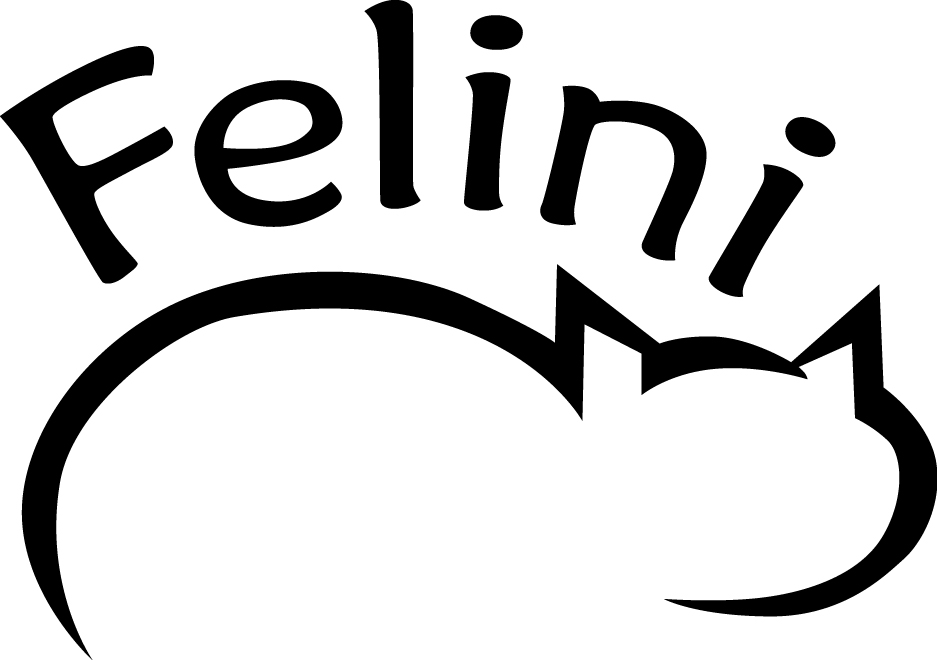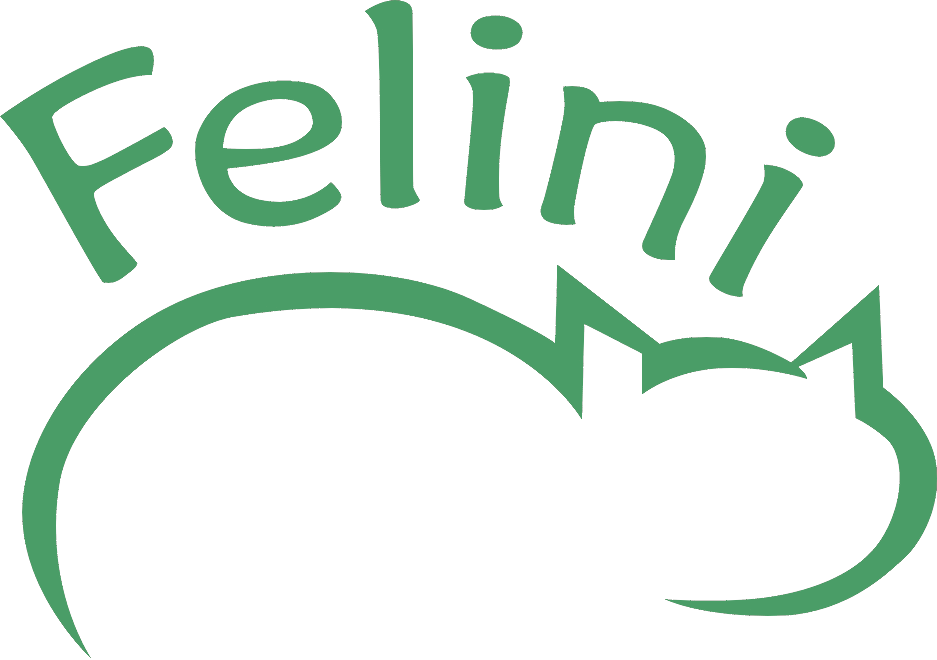Preparing Cat Meals with Felini Complete
Felini Complete is a balanced dietary supplement containing vitamins, minerals, trace elements, and taurine, designed to enrich raw or cooked meat for cats.
Cats are true carnivores and therefore have very specific nutritional needs. Their natural diet consists of whole prey animals such as mice and occasionally small birds. These supply them with protein, fat, amino acids (from meat), vitamins (from organs), minerals, and trace elements (from bones and blood). Felini Complete ensures that plain meat becomes a complete and balanced meal.
Feeding Guidelines and Dosage
-
An average adult cat (approx. 10 lb/ 4.5 kg body weight) requires about 4.8 oz (≈ 135 g) of meat per day, divided into 2–3 meals.
-
Larger cats need more food, roughly 1.1 oz (≈ 30 g) of meat per kg of body weight.
-
Always adjust the total food amount according to your cat’s age, weight, and activity level. Younger, active cats need more; older, calmer cats need less.
⚠️ Important: Always calculate the Felini Complete dosage based on the amount of meat, not on your cat’s weight.
Mixing ratio (per meal):
-
3.5 oz (≈ 100 g meat) + 1 level measuring spoon Felini Complete 0,044 oz (≈ 1.25 g) + 1–2 tablespoons water.
-
A precision scale is recommended for easier dosing.
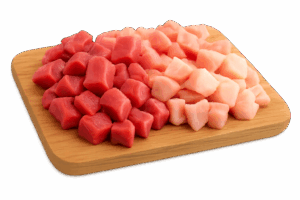 |
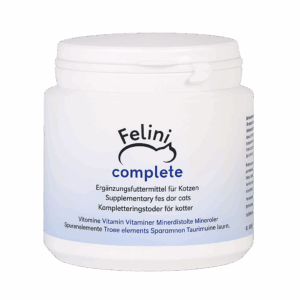 |
|
|---|---|---|
| 9 lb (≈4 kg) | 4.2 oz (≈120 g) | 0.05 oz (≈1.5 g) |
| 11 lb (≈5 kg) | 5.3 oz (≈150 g) | 0.07 oz (≈1.9 g) |
| 13 lb (≈6 kg) | 6.3 oz (≈180 g) | 0.08 oz (≈2.3 g) |
| 15 lb (≈7 kg) | 7.4 oz (≈210 g) | 0.09 oz (≈2.6 g) |
| 17.5 lb (≈8 kg) | 8.5 oz (≈240 g) | 0.11 oz (≈3.0 g) |
For larger batches: Mix 0.44 oz (≈ 12.5 g) Felini Complete per 2.2 lb (≈ 1 kg) of meat.
Up to 15% heart meat may be included. Do not add liver, bones, or bone meal, since Felini Complete already contains sufficient calcium, phosphorus, and vitamin A.
Felini Complete is formulated only for plain meat. Do not mix it into complete commercial cat food (e.g. canned food).
The only exception: pure meat cans (meat + water only). For example, a 7 oz (≈ 200 g) can with 80% meat =5.6 oz (≈ 160 g meat) requires 0.07 oz (≈ 2 g) Felini Complete. Make sure there is enough fat content; supplement if necessary.
Protein and Fat Content
The average fat content of the meal should be about 10%.
Combine lean meats with fattier cuts.
If only lean meat is used, add a pure animal fat (e.g. plain lard, without salt, onions, or additives) until ~10% fat is reached.
Optionally, add up to 5% dietary fiber (e.g. carrot, rice).
Suitable meats
All common meats can be fed raw: turkey, chicken, beef, lamb, horse, game, and more.
🚫 Exception: Pork (including wild boar) must only be fed cooked, because raw pork can transmit Aujeszky’s disease, which is fatal to cats.
For cooked meat, always feed the cooled cooking liquid as well.
⚠️ Do not cook Felini Complete and do not add it to hot food, as heat destroys vitamins.
Fish
Fish can be a healthy variation, but since cats are primarily meat-eaters, it should be offered no more than once a week.
If fed raw, use salmonids (e.g. true salmon, trout).
Whitefish is not suitable raw, as it contains thiaminase, an enzyme that destroys vitamin B1. Cooking neutralizes thiaminase, so cooked whitefish is safe.
Storage and preparation
Prepared portions can be frozen, but keep storage times short (max. 4 weeks) to prevent vitamin loss.
Ideally, freeze only the pre-portioned meat and add Felini Complete just before feeding.
Feeding Variety
Variety is important! Offer different cuts: breast, neck, thigh (boneless), and pieces with skin.
Product Information
Felini Complete contains no allergens and no fillers.
Store in a cool, dry place.
For cats with kidney disease (CKD): please use Felini Renal for a phosphorus-reduced diet.
Preparing Cat Meals with Felini Renal
Felini Renal is a phosphorus-free dietary supplement with vitamins, minerals, trace elements, and taurine. It is perfectly suited as a supplement to raw feeding and to cooked meat as part of a phosphorus-reduced kidney diet.
Cats are true carnivores and therefore have very specific nutritional needs. Their natural diet consists of whole prey animals such as mice and occasionally small birds. These supply them with protein, fat, amino acids (from meat), vitamins (from organs), minerals, and trace elements (from bones and blood). Felini Renal supplements plain meat to create a complete meal with reduced phosphorus content.
Feeding Guidelines and Dosage
-
An average adult cat (approx. 10 lb/ 4.5 kg body weight) requires about 4.8 oz (≈ 135 g) of meat per day, divided into 2–3 meals.
-
Larger cats need more food, roughly 1.1 oz (≈ 30 g) of meat per kg of body weight.
-
Always adjust the total food amount according to your cat’s age, weight, and activity level. Younger, active cats need more; older, calmer cats need less.
Make sure your cat with kidney disease eats and drinks sufficiently and regularly.
⚠️ Important: Always calculate the Felini Renal dosage based on the amount of meat, not on your cat’s weight.
Mixing ratio (per meal):
-
4.4 oz (≈ 125 g) meat + 1 level measuring spoon Felini Renal 0.044 oz (≈ 1.25 g) + 1–2 tablespoons water.
-
A precision scale is recommended for easier dosing.
 |
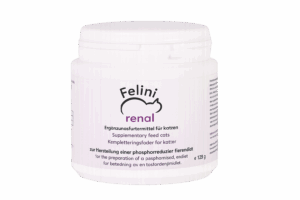 |
|
|---|---|---|
| 9 lb (≈4 kg) | 4.2 oz (≈120 g) | 0.042 oz (≈1.2 g) |
| 11 lb (≈5 kg) | 5.3 oz (≈150 g) | 0.053 oz (≈1.5 g) |
| 13 lb (≈6 kg) | 6.3 oz (≈180 g) | 0.063 oz (≈1.8 g) |
| 15 lb (≈7 kg) | 7.4 oz (≈210 g) | 0.074 oz (≈2.1 g) |
| 17.5 lb (≈8 kg) | 8.5 oz (≈240 g) | 0.085 oz (≈2.4 g) |
For larger batches: mix 0.35 oz (≈ 10 g) Felini Renal per 2.2 lb (≈ 1 kg) of meat.
For a kidney diet, use muscle meat only; heart may make up to 20% of the meal. We recommend avoiding skin, organs, and meat containing connective tissue, since these can form biogenic amines or ammonia, which may negatively affect the progression of the disease.
Protein and Fat Content
Reducing the protein content of the food relieves the kidneys and leads to less urea, which helps reduce the symptom of nausea. At the same time, cats require a high protein intake, as an undersupply causes muscle loss.
-
The average fat content should be around 12%.
-
To reduce the relative protein and phosphorus content while maintaining calorie intake, the fat content can be increased up to 20%, if well tolerated — e.g., by adding lard.
-
Make sure the lard contains no additives such as onions, spices, or salt.
-
Salmon oil has an anti-inflammatory effect due to its high content of unsaturated fatty acids, but should not be fed excessively. 10 ml per week (≈ 2 teaspoons) is a good guideline.
-
Fat is also a good flavor enhancer, improving acceptance of the kidney diet.
For some cats, lightly steaming the meat can help counteract nausea. If needed, up to 5% dietary fiber (e.g., carrot, rice) may be added.
Vitamin Supply and Medical Support
Felini Renal contains higher amounts of water-soluble B vitamins to counteract losses caused by increased urination.
In advanced stages of the disease, the diet can be supplemented with a prescription phosphate binder.
A kidney diet must be fed lifelong and should be implemented immediately after a diagnosis of chronic kidney disease (CKD).
Important Feeding Instructions
Since Felini Renal already contains sufficient calcium and vitamin A, do not add liver, bones, or bone meal.
Felini Renal is designed to supplement plain meat only and must not be mixed into complete commercial cat food (e.g. canned food).
Exception: pure meat cans containing only meat and water.
-
Make sure no salt, calcium, bone paste, carcasses, or other additives are included.
-
Supplement based on the meat content:
-
A 7 oz (200 g) can with 80% meat = 5.6 oz (160 g meat) requires 0.06 oz (1.6 g) Felini Renal.
-
-
Ensure there is sufficient fat content and add more if necessary.
Suitable Meats
All common meat types such as turkey, chicken, beef, lamb, horse, game, and others are suitable for raw feeding.
🚫 Exception: pork (including wild boar) must only be fed cooked, as it may contain the Aujeszky virus, which is fatal to cats. Cooking destroys the virus.
For cooked meat, always include the cooled cooking liquid when feeding.
⚠️ To avoid vitamin loss, Felini Renal must not be cooked or added to hot food.
Fish
Fish can be a nice variation in the diet. However, since cats are primarily meat eaters, it should be offered no more than once per week.
-
If feeding raw fish, it must be a salmonid (e.g., true salmon or trout).
-
Whitefish is not suitable raw because it contains thiaminase, an enzyme that destroys vitamin B1 and can lead to deficiencies.
-
Heating neutralizes thiaminase, so cooked whitefish can be fed without concern.
Storage
Prepared mixtures can be frozen, provided freezing times are kept short.
We recommend not freezing prepared mixes longer than 4 weeks, to avoid vitamin loss. Ideally, freeze only the pre-portioned meat and add Felini Renal immediately before feeding.
Product Information
-
Felini Renal contains no allergenic ingredients and is free from fillers.
-
Store in a cool, dry, dark place.
-
Felini Renal is a dietary supplement for cats with kidney disease.
-
Healthy cats should be given Felini Complete for a homemade, healthy meal with fresh meat.
